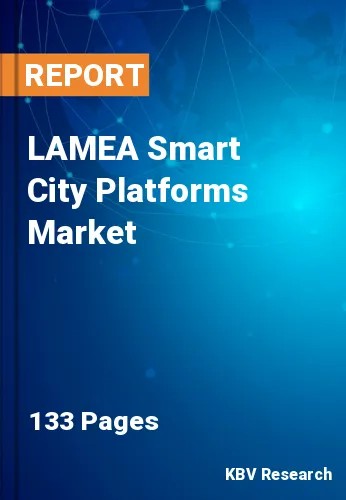The Latin America, Middle East and Africa Smart City Platforms Market would witness market growth of 17.2% CAGR during the forecast period (2021-2027).
Smart city platforms leverage the potential of IoT to provide streamlined access to data across the various functions that exist in modern cities such as health & public safety, transportation management, governance, environmental (including water and wastewater), energy, the built environment, and among others. Over the years, these systems have been in isolation with various traditional devices and systems. Smart City platforms offer a common environment in order to manage data from all of these applications and systems.
Further, these platforms are capable of extracting a massive amount of data from these legacy systems and converting it into beneficial insights to manage the rising problems within the city. Thus, these factors are anticipated to boost the growth and demand for the smart city platforms market during the forecasting period.
End users are putting high investments in the smart city platforms with an aim to deploy modern technologies. In addition, smart city platforms provide substantial economic, social, and environmental value for their cities as well as communities. Many regulatory bodies across this region are aggressively introducing smart city initiatives to enhance the effectiveness, efficiency, and appeal of their services and infrastructure. Modern technology advancements are instrumental to these efforts but also need proper selection and installation. Deploying a suitable technology strategy before introducing a significant program is necessary to prevent a huge proliferation of incompatible, non-interoperable solutions that reduce advantages and increase the current support costs.
The cities in the region are aiming to gain the status of the smart city. For example, both Cape Town and Johannesburg have rolled out initiatives and plans, but still not have realized their dream of becoming smart cities. With the help of this software, the city was able to deploy new applications while managing its current infrastructure, providing new opportunities to smoothly deploy new smart city applications that can enhance data collection, insight, and eventually the outlook of the city while lowering down the costs.
The Brazil market dominated the LAMEA Smart City Platforms Market by Country 2020, and would continue to be a dominant market till 2027; thereby, achieving a market value of $7.86billion by 2027. The Argentina market is poised to grow at a CAGR of 17.9% during (2021 - 2027). Additionally, The UAE market would experience a CAGR of 16.9% during (2021 - 2027).
Based on the Offering, the Smart City Platforms Market is segregated into Platforms (Connectivity Management Platform, Integration Platform, Device Management Platform, Security Platform, and Data Management Platform) and Services (Integration & Deployment, Advisory Consulting, and Support Maintenance). Based on the Delivery Model, the Smart City Platform Market is divided into hybrid, offshore, and onshore. Based on countries, the market is segmented into Brazil, Argentina, UAE, Saudi Arabia, South Africa, Nigeria, and Rest of LAMEA.
Free Valuable Insights: The Global Smart City Platforms Market is Predict to reach $248.60 billion by 2027, at a CAGR of 14.7%
The market research report covers the analysis of key stake holders of the market. Key companies profiled in the report include IBM Corporation, Oracle Corporation, Schneider Electric SE, Siemens AG, Microsoft Corporation, Amazon.com, Inc., Intel Corporation, Hitachi, Ltd., NEC Corporation, and Huawei Technologies Co., Ltd.
By Offering
By Delivery Model
By Country
Our team of dedicated experts can provide you with attractive expansion opportunities for your business.

